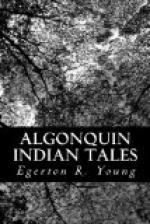The following are a couple of the legends that Mary told them while they were prisoners in their own room that day.
THE LEGEND OF THE SWALLOWS.
“Long ago,” said Mary, “there were some Indian families who lived on the top of a very high hill, like a mountain. They had quite a number of small children, and I am sorry to say they were very naughty and would often disobey their parents. One of their bad deeds was to run away, and thus make the father and mother very unhappy until they returned. Their parents were very much afraid that some of the Windegoos or wild animals would catch them when they thus ran away by themselves, with no strong man to guard them.
“So the parents tried to make their homes as nice as possible for them. They made all sorts of toys for them and gave them nice little bows and arrows, and other things, that ought to have amused them and kept them happy at home. All the efforts of their parents, however, were of no use. They soon were tired of their home amusements, and when their parents’ backs were turned they would run away.
“At length their conduct became so bad, and the parents found themselves so powerless to prevent it, that they decided to appeal to the Indian Council for assistance. For a time the stern commands of the Chief were listened to and obeyed. Then they neglected his words, and about as frequently as ever they were found playing truant from their homes and parents.
“At length, on one occasion when they had all run away and had been off for several days and could not be found, their fathers and mothers called upon Wakonda to look for them and to send them home. Wakonda was very angry when he heard about these naughty children running away so much, and so he set off in a hurry to find them. After a long search he discovered them on the bank of a muddy river making mud huts and mud animals. He was so angry at them that he at once turned them into swallows, and said, ’From this time forward you will ever be wanderers and your homes will always be made of mud,’ and so it has been.”
“I say, Mary, did you remember that yarn because Minnehaha and I ran away?” said Sagastao.
“Well, we were not making mud huts,” said Minnehaha.
Mary was not to be caught, however, even if she did love them so much, and she did not answer Sagastao’s question, although in her heart she was not sorry if he saw something in the legend that would deter him from again running away.
HOW SOME CRUEL MEN WERE PUNISHED WHO TEASED AN ORPHAN BOY.
“There was once an old grandmother who was left alone with only an orphan grandson. All of her other relatives were dead. This boy was a very industrious little fellow, and did all that he could to help his grandmother. They both had to work very hard to have sufficient to keep them from starving. Together they would go out in their canoe and catch fish. They also set many snares in the forest to catch rabbits, partridges, and other small game.




